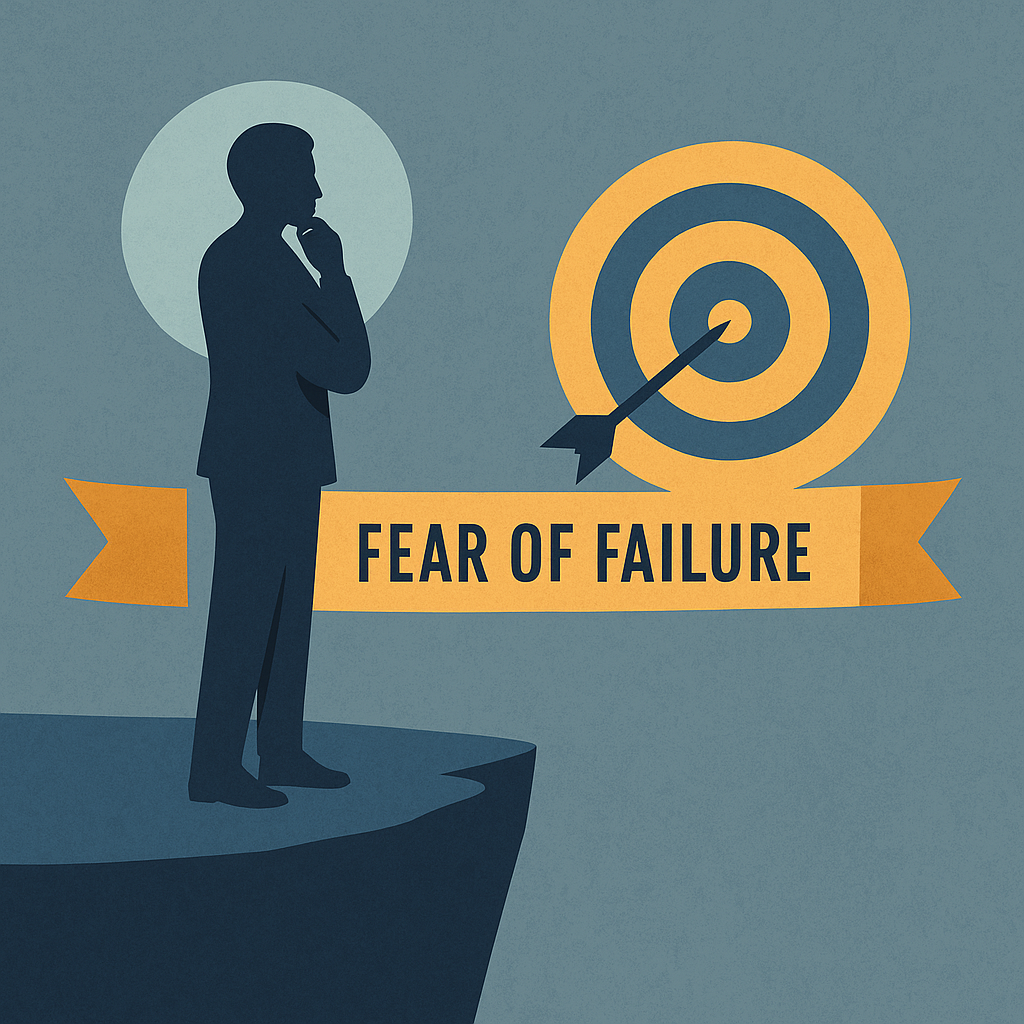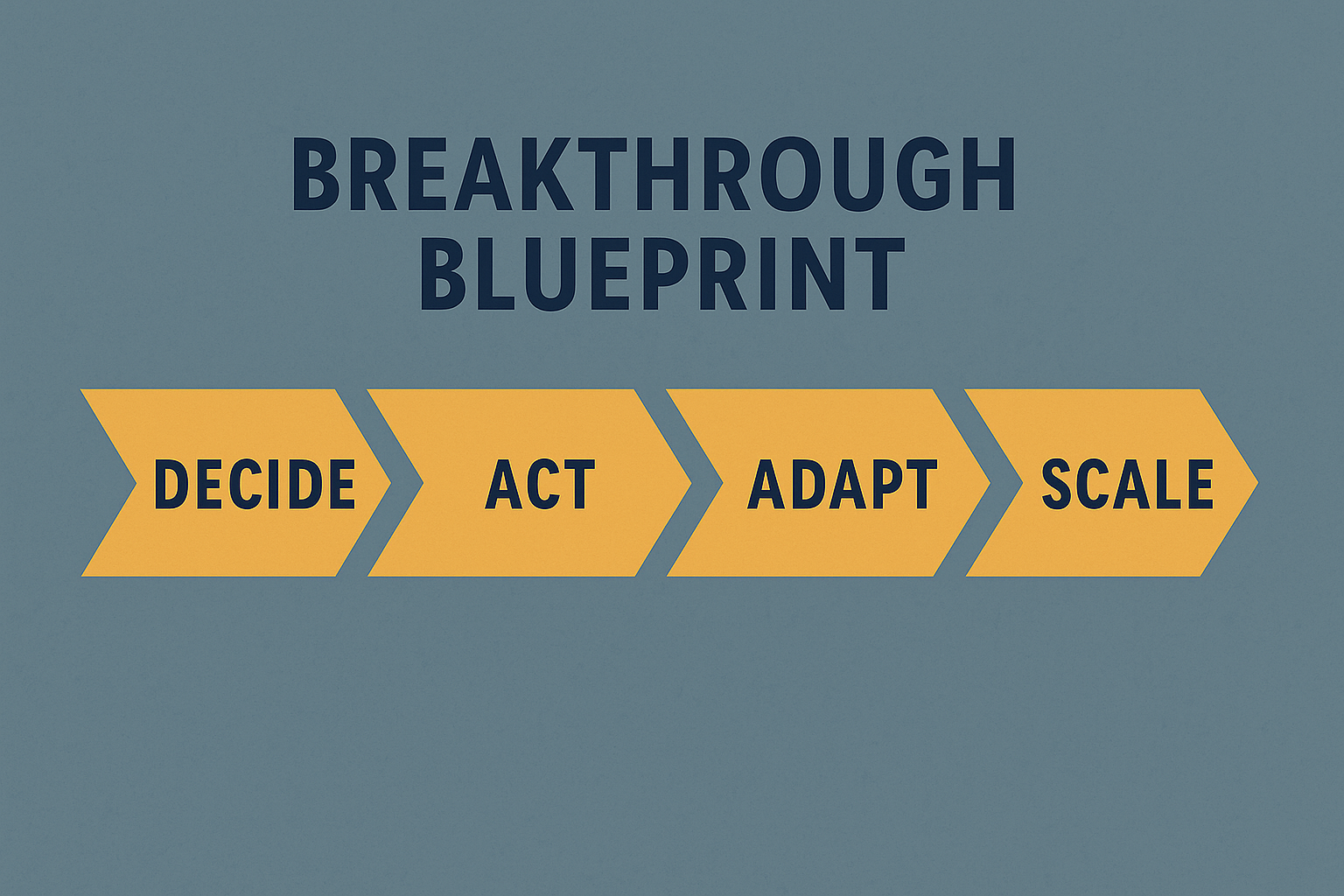By Jacob Hess / August 22, 2025

What You’ll Learn in This Guide
- Overcoming Fear in Business: The Quiet Price of Playing Small
- How Playing Small Hurts Your Business
- The Psychology Behind Overcoming Fear in Business
- The Breakthrough Blueprint: Decide → Act → Adapt → Scale
- Real Stories: Founders Who Stopped Playing Small
- Practical Steps to Break Free
- FAQs: Overcoming Fear in Business
- Turn Fear Into Momentum — Starting Today
Overcoming Fear in Business: The Quiet Price of Playing Small

Overcoming fear in business is one of the most important skills any founder can master. Fear rarely announces itself; it appears as hesitation, overthinking, and the plans you never act on. While “later” feels safe, each delay quietly taxes your time, opportunities, and growth.
Every moment spent second-guessing a decision delays progress and trains hesitation into a habit. Treat fear like a silent business partner who invests nothing but still claims a share of your profits through inaction.
How Playing Small Hurts Your Business

Missed Opportunities
That investor you didn’t pitch, the price you didn’t raise, the product you didn’t ship—someone else moved while you waited. Opportunity cost is invisible but real, and it’s often larger than the risk you were avoiding.
Eroded Confidence
Choosing safety over progress reinforces “I’m not ready.” This loop compounds into self-doubt, making every decision feel heavier until momentum stalls.
Stalled Growth
Protecting against failure by avoiding action guarantees stagnation. Growth requires experiments, and experiments require motion.
The Psychology Behind Overcoming Fear in Business

Your brain is built for safety, not success. When you consider a risky move—hiring, investing, launching—your amygdala can react as if there’s immediate danger. This skews decisions toward short-term protection over long-term growth (Harvard Business Review: What Fear Does to Decision-Making).
Recognize Fear for What It Is
Fear is a signal, not a stop sign. Name it: “I’m afraid of rejection.” Labeling reduces intensity and restores control.
Take Small, Strategic Risks
Run small tests that generate real data: ship an MVP to five users, raise rates for the next three proposals, publish that thought-leadership post. Action creates evidence; evidence calms fear.
Reframe Failure as Data
Treat misses as feedback loops. Post-mortems sharpen instincts and accelerate learning (Entrepreneur: Fear of Failure as a Growth Barrier).
The Breakthrough Blueprint: Decide → Act → Adapt → Scale

Decide: Perfect information never arrives. Choose with what you have and commit.
Act: Take the smallest step that produces real feedback—send the proposal, launch the pilot, ask for the sale.
Adapt: Use feedback to refine positioning, pricing, or product. Failure isn’t fatal; it’s instructional.
Scale: Double down on what works. Systematize the validated path and pour resources into it.
Real Stories: Founders Who Stopped Playing Small
- Maria, bakery owner — After fearing no one would subscribe, she launched a bread club. Within 60 days she had 120 recurring customers and steadier cash flow.
- DeShawn, consultant — He reframed rejection as feedback and pitched enterprise prospects. Two five-figure contracts closed in a single quarter.
- Leila, coach — She posted one imperfect video per week for 12 weeks. Her audience tripled and inquiries doubled.
Practical Steps to Break Free
- Audit Your Decisions — List three choices you delayed due to fear. Estimate the cost in time and revenue.
- Set One Bold Goal — Choose a target that scares you. Commit to one 24-hour action that moves it forward.
- Seek Accountability — Share the goal with a peer, mentor, or mastermind. External pressure reduces hesitation.
- Build a “Proof List” — Track every courageous action and outcome. Evidence compounds into confidence.
- Reward Progress — Celebrate actions taken, not just wins achieved. Momentum is a habit.
FAQs: Overcoming Fear in Business
How do I know if fear is holding me back?
If you keep waiting for the “right time,” over-researching, or second-guessing ideas, fear is likely in the driver’s seat.
Is fear always bad in business?
No. Fear can highlight important risks. Use it as input—act with it, not under it.
Can small risks really change my business?
Yes. Small, consistent actions build confidence and compound into major breakthroughs.
What if I fail?
Failure isn’t the opposite of success—it’s part of it. Treat each attempt as data, not a verdict.
How can I build a habit of bold action?
Start with daily micro-actions and track them. Repetition builds momentum and resilience.
Turn Fear Into Momentum — Starting Today
Overcoming fear in business isn’t about erasing fear—it’s about moving despite it. Playing small might feel safe, but it quietly taxes your growth, impact, and fulfillment. Start now: send the email, launch the pilot, raise the price. Each courageous step builds confidence and compounds into results.
Ready to turn your voice into visibility and your ideas into leads? Work with me to craft strategic content that drives growth.
